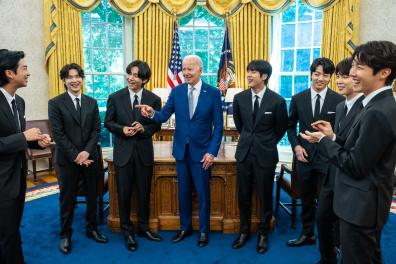Conference "From K-POP to Webtoons: beyond global success, where is South Korean soft power headed?", September 28

Registration required to attend the conference in person or remotely.
He's no longer just the icon of K-POP, but the standard-bearer of South Korea. With its army of fans all over the planet, the BTS group is so influential that it was received by Joe Biden at the White House on May 31. Today, the iconic boy band is nothing less than one of the world's biggest-selling record companies. In other words, the pinnacle of the "Hallyu", the "South Korean wave" that has been sweeping over us for the past thirty years. The instrument of a skilfully multiplied cultural soft power, embodied not only in music. From the very proper What is Love to the ultra-violent Squid Game, K-dramas are thrilling viewers from Seoul to New York. Digital comics, popularized abroad by the Webtoon application developed by Naver, the "South Korean Google", now compete with manga in the hearts of Western readers. And let's not forget the Oscar-winning Parasite, which put the film industry in the Land of the Morning Calm on top of the world.
However, the "Korean wave" was not conceived from the outset as an export product. Originally, the phenomenon was organic. Music, comics and TV series are primarily aimed at South Koreans. In the late 1990s, the South Korean government took advantage of the Asian financial crisis to capitalize on the cultural sector. And to capitalize on the cultural sector by targeting the export of its products and investing as much in it as in electronics and automobiles. Added to this is a totally innovative way of promoting its star system, combined with a very dynamic fan culture. Today, South Korea is one of the world's top five film industries, and the value of its music industry exports reached over $756 million in 2019.
Beyond the spectacular figures, where is "Hallyu" headed? What a paradox in the worldwide success of a K-POP that often conveys standards of beauty that are problematically homogeneous: the extreme thinness of teenage artists forced into celibacy! The ethnocentrism of K-Dramas is also becoming increasingly controversial, with clichés bordering on racism and a lack of diversity in casting. All in all, Hallyu seems to run counter to Western pop culture.
In parallel, the "Korean wave" has also given a large audience to more critical productions: witness the success of Park Chan-Wook, Bong Joon-ho and Squid Game. Like Frankenstein's monster, Hallyu paved the way for alternative productions which, without it, would surely have remained confined to Korea's borders.
This talk will help us understand the global reach of South Korean pop culture. How did it come about? What are the reasons for its success, even in countries that know nothing about Korea? How did it become a major instrument of the South Korean government's soft power in the face of American cultural hegemony? Where is it headed today?
With:
- Patrick Messerlin, economist and professor at Sciences Po.
- Didier Borg, founder of Delitoon, Europe's first specialized Webtoon digital platform.
Moderator :
- Marine Jeannin, journalist with Asialyst and RFI.
Co-organizers: Inalco and Asialyst.com, the site for information and analysis on the whole of Asia